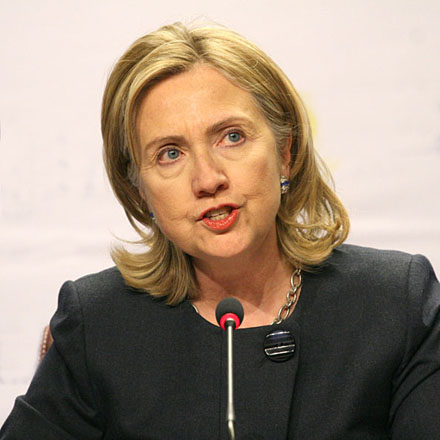Azerbaijan, Baku, Sept. 10 /Trend S.Isayev, T. Jafarov/
The U.S. is "not setting deadlines" for Iran and still considers negotiations as "by far the best approach" to prevent Iran from developing nuclear weapons, Secretary of State Hillary Clinton said, Bloomberg reported.
While Clinton said in an interview on Sunday that economic sanctions are building pressure on Iran, Israeli Prime Minister Benjamin Netanyahu said last week the sanctions aren't slowing Iran's nuclear advances "because it doesn't see a clear red line from the international community."
Asked if the Obama administration will lay out sharper "red lines" for Iran or state explicitly the consequences of failing to negotiate a deal with world powers by a certain date, Clinton said, "We're not setting deadlines."
"We're watching very carefully about what they do, because it's always been more about their actions than their words," Clinton said in the interview with Bloomberg Radio after wrapping up meetings at an Asia-Pacific forum in Vladivostok, Russia.
While the U.S. and Israel share the goal that Iran not acquire a nuclear weapon, Clinton said there is a difference in perspective over the time horizon for talks.
"They're more anxious about a quick response because they feel that they're right in the bull's-eye, so to speak," Clinton said. "But we're convinced that we have more time to focus on these sanctions, to do everything we can to bring Iran to a good-faith negotiation."
In the past week, Clinton has been to both China and Russia, speaking with leaders of both nations to seek unity in their Iran stance. Afterward, she said China and Russia share the U.S.'s firm view that Iran must be stopped from acquiring a nuclear weapon.
The Obama administration still believes the best way to do that is to continue to offer a negotiated settlement, while increasing the pain for Iran of refusing to accept the deal by squeezing it with financial and oil sanctions, she said.
In June, negotiators for six world powers proposed that Iran ship out its stockpiles of 20-percent enriched uranium - to remove the potential that it will further processed to 90 percent to fuel a nuclear bomb - and to stop enrichment at Fordo in exchange for energy and aviation incentives. Israel wants all Iranian uranium enrichment halted and enriched uranium removed.
Iran says its nuclear program is for peaceful electric power and medical purposes and has rebuffed any deal that it sees as giving up its right to enrich uranium.
Efforts by international negotiators "to pin Iran down on what exactly they are willing to do are still under way, and we will be having some meetings in the next month in New York and elsewhere to take stock of where we are," Clinton said.
Leaders from the six powers involved in negotiations with Iran are expected to attend the annual UN General Assembly in New York this month.
"It's a very challenging effort to get them to move in a way that complies with their international obligations," Clinton said of the Iranians. "But we believe that is still by far the best approach to take at this time."
Asked about pressure from Israel to give Iran an ultimatum to dismantle disputed aspects of its nuclear program within months, Clinton said the U.S. has "always said every option was on the table, but we believe in the negotiation," and are at the same time stepping up pressure from sanctions.
At the same time, Clinton said Israel has supported the Obama administration's effort to unite the international community behind the toughest sanctions ever.
"The sanctions, we know, are having an effect," she said.
Since April, the five permanent members of the UN Security Council -- the U.S., the U.K., France, China and Russia - plus Germany, have engaged in three rounds of diplomacy with Iran. Even with pressure from an array of new U.S. and EU sanctions on energy, trade, banking and shipping, the talks have failed so far to persuade Iran to suspend aspects of its nuclear program.
The chief negotiator for the six world powers negotiating with Iran, European Union foreign policy chief Catherine Ashton, last spoke with her Iranian counterpart, Saeed Jalili, more than a month ago, and said at the time more progress was needed to close the gap before any return to talks.
Over the weekend, Ashton met with EU foreign ministers in Cyprus, and said new sanctions on Iran were under consideration.
Edited by: S. Isayev






